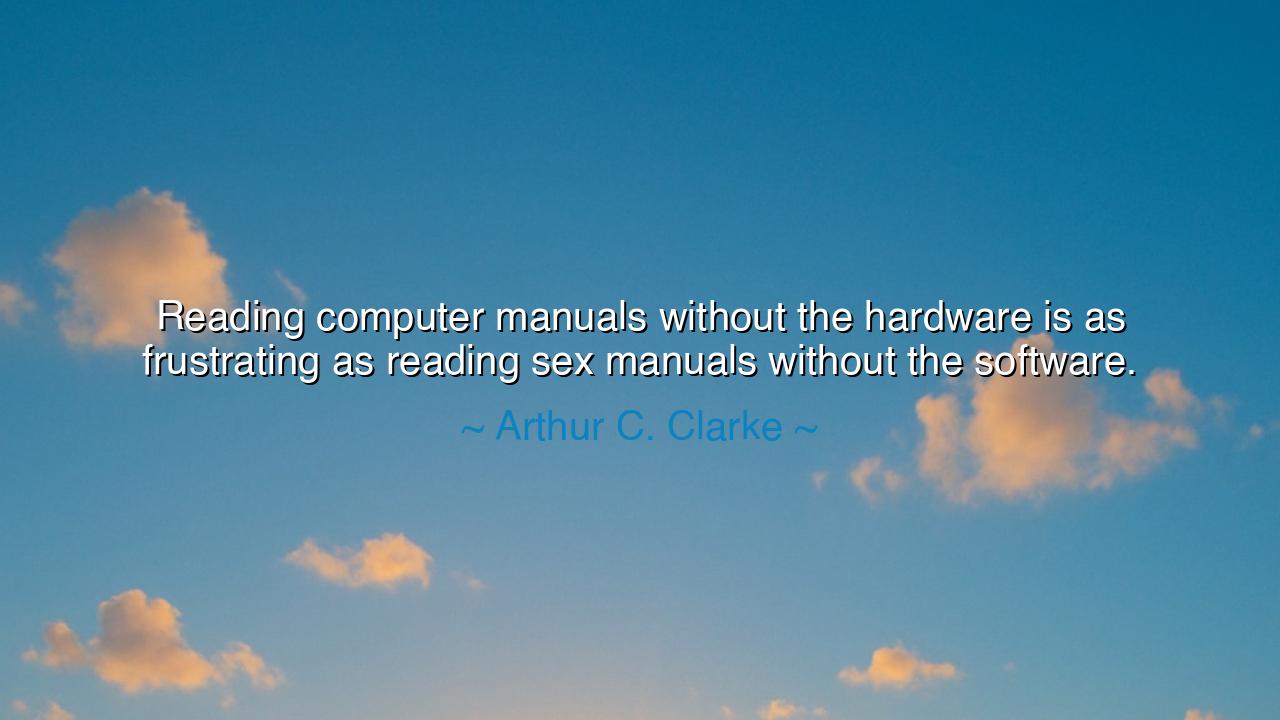
Reading computer manuals without the hardware is as frustrating
Reading computer manuals without the hardware is as frustrating as reading sex manuals without the software.






Arthur C. Clarke’s words, “Reading computer manuals without the hardware is as frustrating as reading sex manuals without the software,” offer a witty and insightful reflection on the nature of knowledge and application. Clarke, one of the great visionaries of the 20th century, uses humor to draw attention to an important truth: theoretical knowledge, in isolation, is often meaningless without the practical experience to back it up. Just as a manual on sex is of little use without the experience of intimacy, so too is a computer manual without the actual hardware—without the physical tools that allow you to implement the knowledge. The quote captures the frustration of engaging with abstract ideas without the practical means to bring them to life, reminding us that true wisdom arises from action, not just theory.
In the ancient world, knowledge was always intertwined with experience. The Greeks, for instance, saw knowledge as something that was meant to be lived, not just read about. Socrates famously taught that true wisdom comes from self-examination and real-world engagement, not just the memorization of abstract concepts. The philosopher Plato wrote about the importance of the philosophical life, where learning was not about theoretical knowledge in isolation but was always about understanding how the ideas applied to the world around us. This aligns perfectly with Clarke’s point that theoretical knowledge alone, without the means to apply it, remains a frustrating and incomplete pursuit.
Consider the story of Aristotle, who not only was a great thinker but also a keen observer of the world. He spent much of his life engaged in direct observation of nature, taking notes on plants, animals, and humans. His insights into biology, for example, were not born merely from reading or theorizing about life; they were grounded in the first-hand experience of interacting with and studying living beings. Aristotle’s philosophy was never confined to the abstract—it was always connected to the world he lived in, making his contributions meaningful and useful. Clarke’s quote emphasizes this same truth: real understanding and growth come when theoretical knowledge is grounded in action.
This connection between knowledge and application also emerges in the tale of Leonardo da Vinci, whose notebooks are filled not just with grand ideas about art and invention, but also with detailed sketches and experiments that demonstrate his understanding of how the world worked. For Leonardo, knowledge was always practical. He didn’t just think about flight, he designed flying machines and tested his ideas in the world. His ability to apply his theories is what made him not just an intellectual, but a true innovator. In the same way, Clarke suggests that knowledge about computers or sex—without the ability to experience them—is not complete.
This leads us to a greater truth, that true knowledge is always about the relationship between theory and practice. Just as an ancient craftsman would never be content with merely reading a guide to their trade, without the tools to put it into practice, modern thinkers are similarly frustrated when their knowledge remains theoretical. Clarke’s quote reminds us that while reading and learning are powerful, they only become meaningful when paired with action—when the hardware or software of life is brought into the equation. It is through engagement and experience that we truly grasp the depth of knowledge, transforming it from an abstract idea into a living reality.
Just as the ancient builders constructed great temples with both tools and ideas, so too must we engage with the tools of modern technology and life to build something meaningful. Knowledge and understanding grow when we stop merely reading about the world and start engaging with it directly. In today’s world, that might mean moving beyond the manual of computer programming and diving into writing code and creating systems. Or it might mean moving beyond the theory of human relationships and actually experiencing connection, intimacy, and mutual understanding. The essence of wisdom, as the ancients taught, is that knowledge must be rooted in the real world.
Lesson for the ages:
True wisdom is not just about collecting facts, theories, or ideas, but about **






AAdministratorAdministrator
Welcome, honored guests. Please leave a comment, we will respond soon